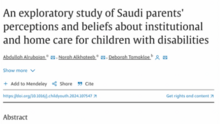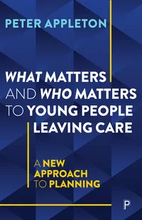Displaying 261 - 270 of 14424
This study investigated social orphans through narratives of young people with experiences of growing up in institutional care in Latvia. The study uses the life histories of participants to explore the phenomenon of social orphans.
This retrospective, national-scale, observational e-cohort study of children entering care in Wales looked at the impact of cumulative risks of parental difficulties on the likelihood of care entry and the impact of the parent's sex.
Adopting a qualitative approach, this study gave voice to seven adoption applicants in Romania who began the adoption journey with one or more children but did not complete the legal process. The goal of the researchers was to understand their experiences throughout the adoption process and disruption. The present study is part of a larger research project that focused on the resilience of the adoptive family in Romania.
In Russia's Belgorod region, near the Ukrainian border, children are being evacuated by train after regional authorities announced 9,000 minors would be moved to other regions. The move follows weeks of deadly bombardment from Kyiv in the region, repeatedly targeted since Russia's invasion of Ukraine in February 2022.
The present qualitative study seeks to understand parents' perceptions of home or institutional care for children with disabilities. The study utilized an exploratory qualitative approach paradigm with five focus groups in the Qassim region of Saudi Arabia.
This qualitative exploratory-descriptive study outlines alternative approaches to psychosocial support for Orphans and Vulnerable Children in four municipalities of Vhembe district in Limpopo Province, South Africa, in the form of community-based interventions.
The authors of this study aimed to gain insight into the perceived living environment in different residential youth care settings from the perspectives of 26 youth, 14 parents, and 35 professionals in the Netherlands.
The 1997 Bringing Them Home report into the removal of Aboriginal children from their families was a turning point in Australia’s history. The inquiry rejected past government policies of assimilation and endorsed the importance of keeping Aboriginal and Torres Strait Islander children with their families.
Niels Peter Rygaard, a leading child psychologist, sheds light on 'missing links' and growth-encouraging assessment methods in this episode of episode of Care Conversations: ICB Podcast. He explores the ways of connecting with children without parental care and ways to make small changes that create a large impact in the world of family strengthening and alternative care.
A valuable resource for practitioners, researchers and educators, this book puts forward a powerful case to think more broadly and flexibly about transition planning with care-leavers, placing the voices of young people at its heart. This book grew out of qualitative research interviews held with a small and diverse sample of young adults who were in the process of transitioning from out-of-home care (foster care, kinship care, or residential care) in London, England.







